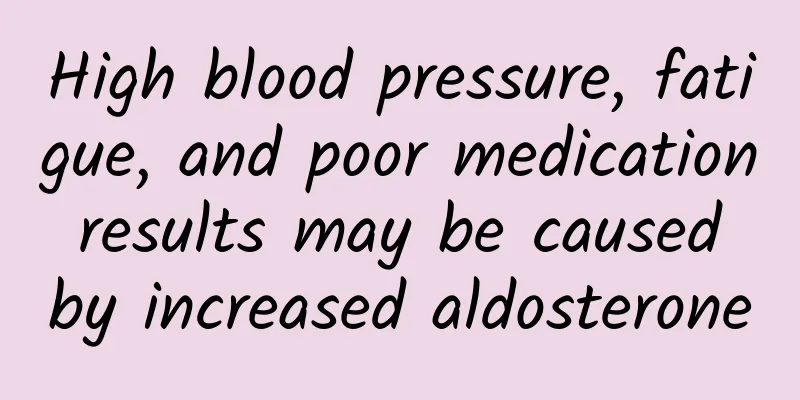High blood pressure, fatigue, and poor medication results may be caused by increased aldosterone

|
A friend in his 40s suffered from high blood pressure and always felt weak. He took several antihypertensive drugs, but the effect was not very good and his blood pressure was always out of control. After going to the hospital for examination, it was found that he had primary aldosteronism. After the diseased adrenal gland was removed by surgery, the high blood pressure was cured. Among young and middle-aged hypertensive patients under the age of 50, 10% of them have similar causes, which are hypertension caused by hyperaldosteronism. Such patients are insensitive to antihypertensive drugs and usually have hypokalemia, muscle weakness, extremity numbness and other symptoms. However, after eradicating the cause of hyperaldosterone, hypertension can also be cured, avoiding lifelong medication. 1. What is aldosterone? Aldosterone is a hormone secreted by the adrenal cortex in the human body, which has the function of regulating electrolytes in the human body. Its specific physiological function is to increase the reabsorption of sodium ions and water by the renal tubules and increase the excretion of potassium ions. When the secretion of aldosterone increases, the human body will retain water and sodium, leading to volume-type hypertension. The causes of aldosterone hyperplasia include aldosteroneoma, bilateral adrenal hyperplasia (idiopathic aldosteronism), family inheritance, cancer, etc. Hypertension caused by aldosterone hyperplasia is more damaging to the target organs of hypertension such as the heart and kidneys than ordinary primary hypertension, so early diagnosis and treatment are particularly important. 2. Manifestations of aldosteronism 1. Refractory hypertension: Increased aldosterone can lead to water and sodium retention, so a sharp increase in blood pressure is an early manifestation of aldosteronism. In addition, due to increased aldosterone, the feedback regulation of the renin-angiotensin-aldosterone system (RASS) will cause a decrease in renin secretion. Among the first-line antihypertensive drugs, drugs such as "pril" and "sartan" produce antihypertensive effects by blocking angiotensin. However, they are not very effective for this type of hypertension caused by increased aldosterone and low renin. It is often necessary to combine 3 to 4 antihypertensive drugs with other antihypertensive drugs such as diuretics, dihydropyridines, and loral drugs to control blood pressure. 2. Muscle fatigue: In addition to causing water and sodium retention, increased aldosterone will also lead to increased potassium ion excretion. If the dietary potassium ion intake is insufficient, potassium deficiency may occur. Potassium ions are responsible for maintaining acid-base balance in the human body, participating in energy metabolism and maintaining normal neuromuscular function. When potassium ions are insufficient in the body, symptoms such as fatigue, easy fatigue, dizziness, and numbness of the extremities will appear. Potassium deficiency will also affect the digestive system, weaken gastrointestinal smooth muscle peristalsis, and cause symptoms such as anorexia, nausea, vomiting, and abdominal distension. 3. Arrhythmia: Hypokalemia has a great impact on the heart, which is manifested as increased myocardial excitability, enhanced autonomy, and reduced conductivity. In the case of short-term mild potassium deficiency, myocardial contractility is enhanced, and in the case of severe chronic potassium deficiency, myocardial contractility is weakened. All these factors combined can easily lead to arrhythmias including ventricular fibrillation. 4. Polydipsia and polyuria: Long-term hypokalemia will cause necrosis of renal tubular epithelial cells, leading to impairment of the concentrating function of the renal tubules, and symptoms such as thirst, polydipsia, and polyuria. If the hypokalemia is not corrected for too long, potassium-losing renal insufficiency may occur. 3. Treatment of Aldosteronism If you suspect you have Aldosteronism, you should test the ratio of plasma aldosterone to renin activity, and also do imaging tests such as adrenal ultrasound, CT, and MRI to determine the specific cause. Unilateral adrenal lesions, such as aldosterone-producing tumors or adrenal hyperplasia, can be removed surgically. If the adrenal glands are bilaterally affected or if surgery is not appropriate, spironolactone, which inhibits aldosterone receptors, can be used for treatment, and antihypertensive drugs can be used to control blood pressure. During medication, blood pressure, blood potassium, liver and kidney function need to be continuously monitored, and medication should be adjusted based on specific indicators. In summary, if you have high blood pressure and often feel weak, and antihypertensive drugs are not effective, you need to use 3 to 4 antihypertensive drugs in combination to control your blood pressure. You should be careful to prevent refractory hypertension caused by increased aldosterone. You need to go to the hospital for examination as soon as possible. Early detection and early treatment can avoid damage to the body. I am pharmacist Huazi, welcome to follow me and share more health knowledge. |
Recommend
What causes lower abdominal and back pain?
There are many reasons for lower abdominal and lo...
Glandular and fatty feel
Many girls work hard on dieting to lose weight, b...
Why do my knees hurt when I do squats? Why can't my knees go beyond my toes when I do squats?
The cold winter has passed, and it is time to slo...
What yoga moves can I do during menstruation?
The menstrual period is often a vulnerable time, ...
How to treat leucorrhea with odor and low back pain
The odor of vaginal discharge is itself an abnorm...
Is it better to run in the morning or at night in winter? What should you pay attention to when running in the morning in winter?
In life, many people have planned to run in order...
The dangers of silicone bras
When women buy underwear, especially bras, they m...
I feel like I can't pee anymore, what's going on?
Incomplete urination refers to the feeling of bla...
How many days does it take for milk to come back naturally after induced labor?
Originally, pregnancy is a very happy thing, but ...
How many days after ovulation does menstruation come?
The ovulation period is calculated based on the m...
Can I get pregnant with pelvic inflammatory disease?
Pelvic inflammatory disease is a very common gyne...
Six-month fetal position picture
A six-month-old baby is already a baby in the sec...
Causes of stomach pain during pregnancy
Many female friends may have a big change in temp...
What is the cause of excessive vaginal discharge?
In fact, we all know in daily life that women'...
Can I eat mushrooms during my period?
When it comes to mushrooms, many of my friends lo...









